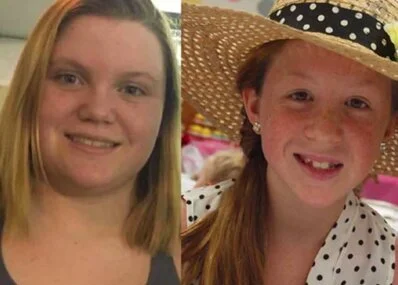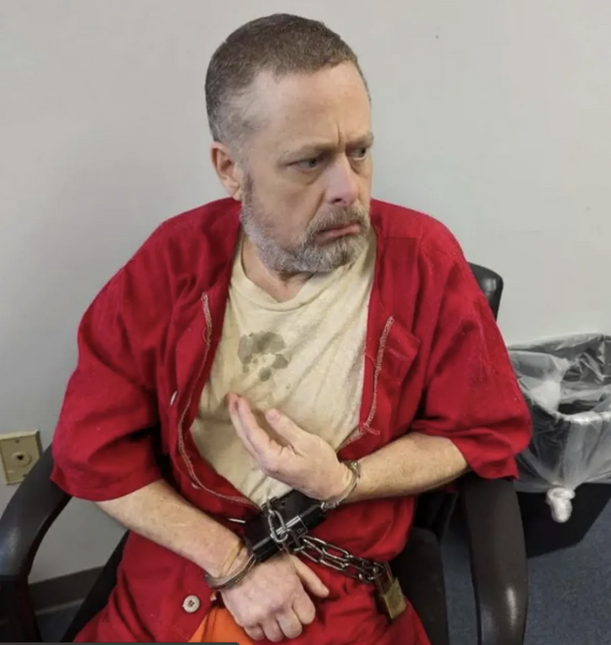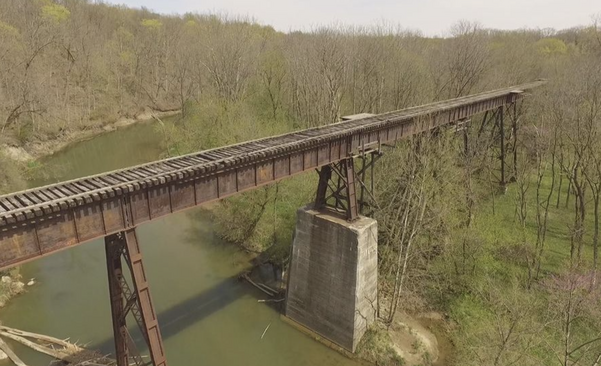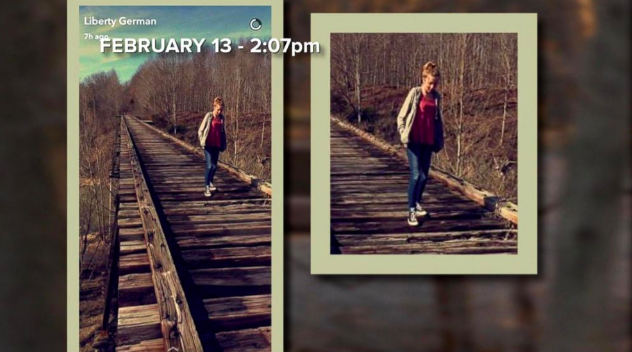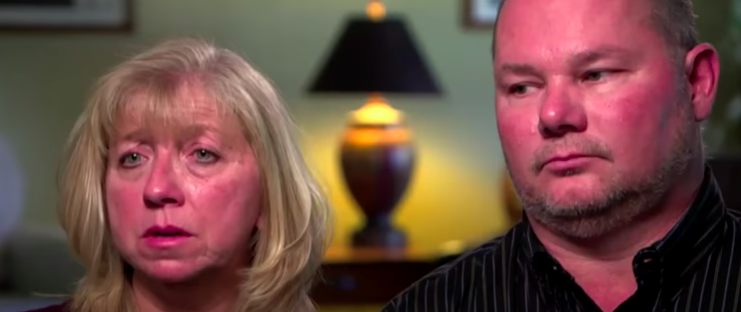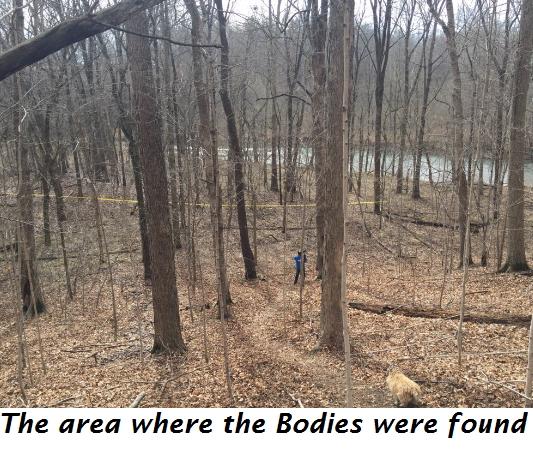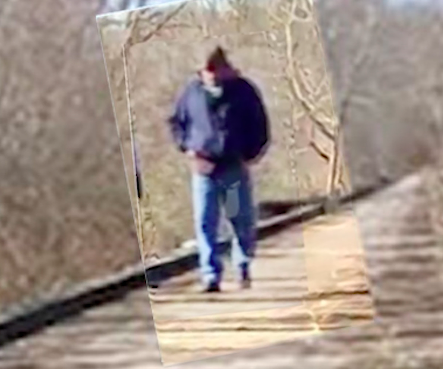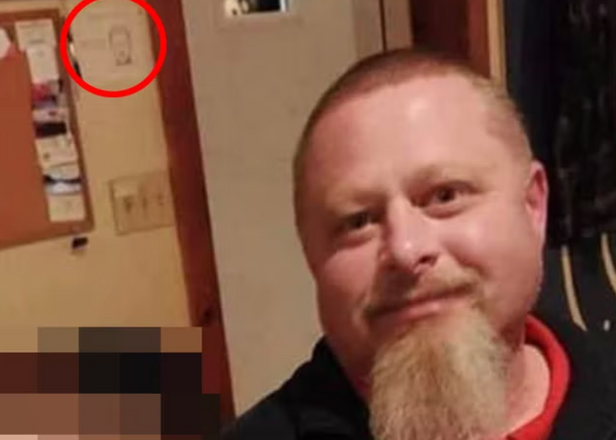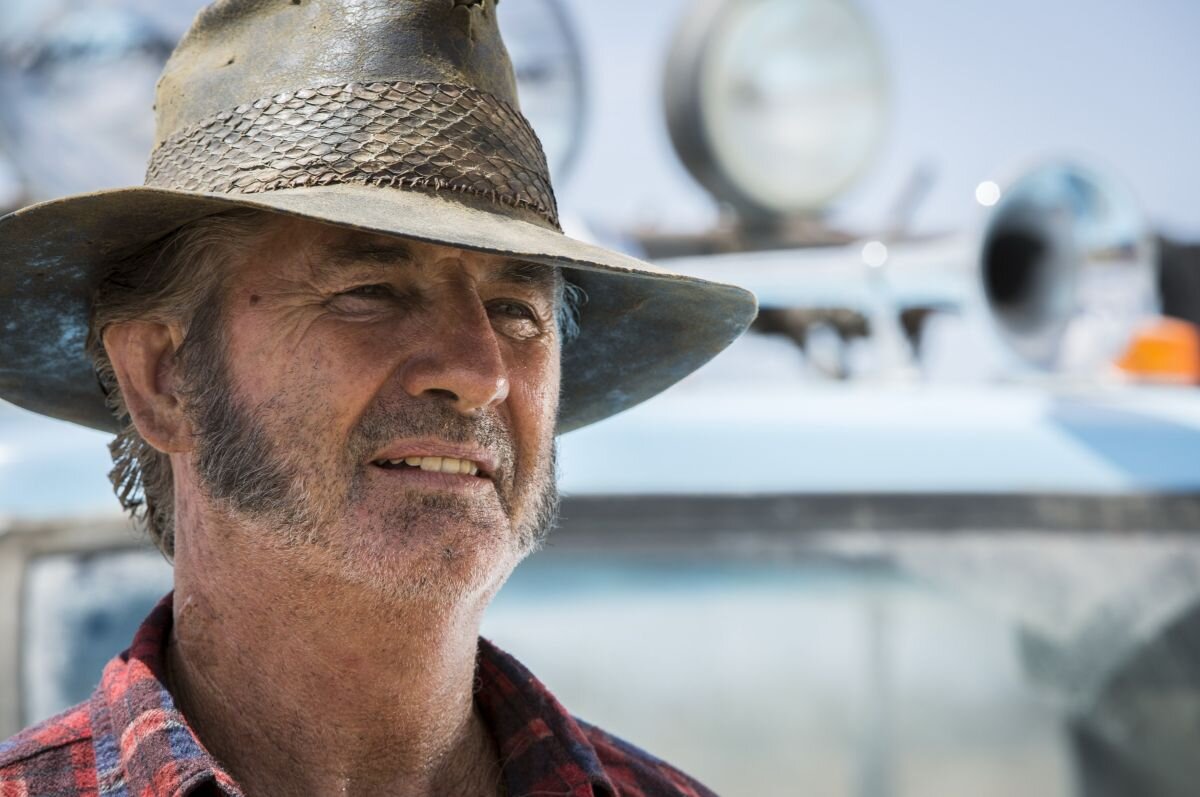
True Crime in the Great Outdoors
The most shocking crimes from national parks, camping trips, backpacker murders, and hiking incidents
The Delphi hiking murders - Abigail Williams and Liberty German
Revised December 20, 2024
Background to the Delphi Murders
On Monday, February 13, 2017, at around 1 pm, Abigail Williams and Liberty German were dropped off near the Delphi Historic Trails in Delphi, Indiana, in the United States.
They hiked onto the abandoned and somewhat dangerous Monon High rail Bridge over Deer Creek. They were meant to be picked up later in the afternoon but did not arrive.
On February 14, 2017, the bodies were discovered on the opposite side of Deer Creek, about 40 yards past the Morning Heights cemetery. Two young girls who were having fun in the Indiana wilderness had their lives cut short by a depraved killer.
The murders had received significant media coverage since a photo and audio recording of the suspect believed to be the girls' killer was found on Libby’s smartphone. Despite the picture and audio recording and over 26,000 tips being sent to police, no arrests were made in the case for over five and a half years.
Then, in late October 2022, the authorities finally announced they had charged a local, 50-year-old Delphi man called Richard Allen with the murder of the two girls.
Allen’s trial finally began on October 18, 2024, and was expected to last 4-5 weeks and actually lasted 17 days. After 19 hours (4 days) of deliberation, the jury reached a verdict on Richard Allen on November 9, 2024. He was found guilty of two counts of murder and two counts of felony murder. He gave virtually no reaction. Andrew Baldwin, the defence attorney sitting next to him, tried to comfort him at this point. Allen was returned to the Wabash Valley Correctional Facility in Sullivan County.
On December 20, 2024, Richard Allen was sentenced to 130 years in prison for the murders of Abby and Libby, 65 years for each murder, to run consecutively.
Serious questions have been understandably asked as to why the Indiana State Police took 7.5 years to bring a man to justice who reported to them that he was at the exact location as Abby and Libby on the Monon High Bridge Trail on the day of their murders and at the same time. He also remarkably like the Bridge Guy Video. Administrative errors played their part, but this was not law enforcement’s finest hour!
Richard Allen in October 2023
The trip to Delphi Historic Trails and timeline of events
Monon High Bridge Trail sign
Monon High Bridge Delphi as of 2017
Monon High Bridge Delphi as of 2017
On Monday, February 13, 2017, the two best friends, 13-year-old Abigail J. "Abby" Williams and 14-year-old Liberty Rose Lynn "Libby" German, asked Libby’s grandmother and primary caregiver, Becky, if they could go to Monon Bridge, a popular walking/hiking spot in the small town of Delphi, Indiana (population around 3000.) Their school was closed that day as snow had fallen over the previous weekend.
The girls were granted permission with the caveat that they secure a ride there and back. Libby’s older sister, Kelsi, agreed to take the girls, and Libby’s father, Derrick, confirmed he would pick them up but told them they would only have a couple of hours.
At 1:35 p.m., Kelsi German dropped the girls off at a trailhead on County Road 300 North, west of the Hoosier Heartland Highway. The location is only a 5-minute drive from downtown Delphi.
At 2.07 pm, Libby posted a photo of Abby walking the Monon Bridge on Snapchat.
At 3.11 pm, Derrick texted Libby to let her know he was heading out to pick them up, but Libby didn’t respond, which was unusual for her.
At 3.14 pm, Derrick was waiting at the designated meeting spot, but there was no sign of the girls.
At 3.30 pm, Derrick phoned Becky to say the girls weren’t where they said they’d be and subsequently, Becky and Derrick made several attempts to call Libby. But the phone was off. Becky’s husband Mike went to the trail after around 10 minutes, and he and Derrick started a search for the girls. At that time, the family didn’t suspect foul play and assumed the girls had either walked home or were in the trail area. Perhaps they had gotten lost, walked too far, or even got injured, and the phone might have run out of battery.
Becky Patty and Mike Patty, grandmother and grandfather of Libby German
By sunset, around 5 p.m., there was no sign of Libby and Abby, and at 5:30 p.m., the authorities were contacted to report them missing.
Search and discovery of bodies
The families initially searched for the girls themselves before calling the police. After a thorough search using sniffer dogs, the bodies of the girls were found in a wooded area at around 12.15 pm on February 14, 2017, about 0.5 miles (0.80 km) east of the abandoned Monon High Bridge. The bodies were about 50 feet (15 m) from the north bank of Deer Creek.
At the Richard Allen trial, it was reported that Pat Brown, a friend of Libby’s grandfather, had come across the bodies. He told the court, “I thought they were mannequins. I turned around, and I yelled we had found them.”
Another search party member, Jake Johns, testified that he and a fellow searcher had seen shoe prints in the area and that looking back toward the bridge, “you could see where the rocks and dirt had been disturbed, absolutely.”
Johns told the court that he spotted a flash of color, which turned out to be Libby’s tie-dyed shirt caught in the branches and brush along the creek, shortly before the bodies were discovered.
The bodies of Abby and Libby were found on the opposite side of Deer Creek on the property of Ron Logan, who had owned the land for 53 years and close to the Morning Heights cemetery. The location can be described as rough terrain with steep banks.
Logan, who later died in 2022, said, “For them to get from there to all the way here with that rough territory they had to walk, you couldn’t carry them in a million years or drag them or drop them off. They had to walk.”
At the time, State Troopers had not publicly stated how the girls were murdered, but it was said to be a “disturbing crime scene”. There were two to three specific signatures associated with the crime scene, suggesting a serial killer was involved. Further details emerged at the Allen trial in October/November 2024.
The investigation into the Delphi murders: Bridge guy photos and audio clips
On February 15, 2017, the police released a photo of a man they wanted to speak to about the murders but did not officially identify him as a suspect until February 19. The photograph of “Bridge Guy” shows a white male wearing blue jeans, a blue coat/jacket, and a hoodie.
Bridge Guy Photo
Bridge Guy Photo
Police later released an audio recording, also retrieved from Libby’s cellphone, recorded at 2.13 pm, of the suspect saying, “Down the hill”. The authorities indicated that more evidence relating to the suspect was found on the phone, but it was not released so as not to compromise any future trial. In the subsequent trial, these details were shown to the jury.
While hiking, the girls actively posted to Snapchat and recorded videos on Libby’s phone. Police said Libby’s phone recorded the entirety of the girl’s last moments. It seems the man's approach on the bridge had unsettled the girls, and Libby appears to have concealed her phone in a successful attempt to capture the perpetrator on film. The man approached them from the north while they were on the south end of the bridge.
Close to the end of the Monon Bridge is a walkable but steep path that twists down a hill. This path is likely where the girls were told to go “down the hill.”
The suspect was described as a white male between 5 feet 6 inches (168 cm) and 5 feet 10 inches (178 cm) tall, weighing between 180 (82 kg) and 220 pounds (100 kg) with reddish-brown hair.
On March 17, police served a search warrant on the owner of the property where Abby’s and Libby’s bodies were found and searched the home and vehicle of Ron Logan.
The warrant application cited multiple complaints that Logan was violent towards women and that he owned numerous weapons, including handguns and knives. He also allegedly lied about where he was at the time that the girls disappeared, saying he was out of the area with a friend that afternoon when cellphone location data placed him in the area around the trail.
The document also stated that his voice was “not inconsistent” with the man captured in Libby's video.
On March 20, Ron Logan was released, with no evidence linking him to the double murder case, and he died in 2020.
The investigation into the Delphi murders: composite sketches
Composite sketch Delphi Murders suspect, July 17, 2019
On July 17, a composite sketch of someone who, at that time in the investigation, was sought as a person of prime interest in the murders. It had been drawn by police from eyewitnesses to a particular hiker of the Delphi Historic Trails on the day that the girls vanished.
On April 19, 2019, Indiana State Police announced a "new direction" in the case. Superintendent Doug Carter released more materials a few days later in a press conference held on April 22. The new materials included a short video recording in which the suspect is seen walking along the rail bridge.
An updated sketch of the suspect was also released, as well as an extended version of the audio recording, in which a slight rise in the suspect's voice can be detected as he says the word "Guys..." before the phrase "Down the hill." It was further explained that the previously released sketch, showing an older man with a goatee and cap, is now considered secondary; by contrast, the clean-shaven individual of the newly revised composite is the primary sketch of the prime suspect. Police say this person may range from age 18 to 40 but caution that his "youthful appearance" could make him look younger than his actual age.
What was strange is that the new primary suspect looked completely different from the original sketch released close to the time of the murders and also to the video clip released from the cellphone.
Updated composite sketch Delphi Murders suspect, April 2019
Investigators also revealed they have reason to believe that the suspect might be hiding in plain sight and that the person is almost certainly familiar with the area of Delphi, whether it be from living or working there or for another reason. An additional plea was made for help in identifying the driver of a vehicle seen off the Hoosier Heartland Highway in Delphi at the former Child Services office between noon and 5 pm on the day of the murders.
Were the Delphi Murders committed by a serial killer?
The question remained for authorities at the time - was this a serial killer or just a random, unplanned attack on the two girls? There was said to be unspecified evidence of signature behavior at the crime scene, as reported by certain State Troopers during interviews, over and above what was required to kill the girls. These signature behaviors could have included post-mortem mutilation, dismemberment, insertion of foreign objects, posing of the bodies, etc.
Possible leads and suspects
In September 2017, a suspect identified as Daniel J. Nations was arrested. Nations was stopped for driving a car with expired license plates in Colorado. He was also wanted in connection with complaints of a man threatening hikers with a hatchet in Woodland Park. A mountain biker, Timothy Watkins, was fatally shot on the trail around the same time Nations was allegedly threatening people. At the traffic stop, police found a hatchet and a .22-calibre rifle in Nations’ car.
Daniel J. Nations
Nations had a lengthy criminal record, including petty offenses and domestic violence, as well as being a registered sex offender after being charged with indecent exposure. He had masturbated in front of a young girl in South Carolina. He had connections to Indiana, claiming to be homeless and “living under an Indiana 67 bridge” in Morgan County since January 31, 2017. Nations was questioned by Indiana State Police, who obtained his DNA.
Nations was then sentenced to three years probation on January 5, 2018, for the charge of threatening hikers in Colorado. Because he had an active warrant from another county, Nations was still in police custody as of January 24, 2018, when he was transferred to Indiana custody on an unrelated charge. In early February 2018, police announced that Nations was no longer considered an active person of interest in the Delphi murders.
In December 2021, Indiana State Police announced that officials had “uncovered” a fake online profile called anthony_shots.
The profile was used on Snapchat and Instagram from 2016 to 2017. It used photos of a known male model, portraying him as enormously wealthy and owning numerous sports cars.
The account was owned by Kegan Anthony Kline, a 27-year-old man with addresses in Kokomo and Peru, close to Delphi.
Kline posed as the model to groom underage girls and get them to send nude photos and their addresses and try to get them to meet him. The male model whose photos were used had no connection to the case. Kline was arrested on charges of child sexual abuse images and child exploitation tied to the account in 2020.
He allegedly admitted to investigators that he groomed underage girls online.
The affidavit said that Indiana State Police and the FBI carried out a search warrant on 25 February 2017 at Kline’s home, and Ron Logan lied to investigators about where he was the day Libby and Abby went missing.
Kline was charged with 30 felonies in 2020 over the case, but he denied any knowledge or involvement in the Delphi Murders.
The documents, filed in 2020 and heavily redacted, do not mention the murders of Libby and Abby, and he was not accused of involvement in their deaths.
Libby’s grandmother, Becky Patty, said that her granddaughter had never mentioned speaking to anyone online before her death and that there had never been any indication that the two girls had arranged to meet anyone online the day they were killed.
The arrest of Richard Matthew Allen in October 2022
Richard Allen
Richard Matthew Allen, from Delphi, Indiana, was taken into custody on Wednesday, October 26, 2022, and booked into Carroll County Jail. Two days later, on October 28, he was charged with two counts of murder, to which he pled not guilty and was moved to a state facility for his safety. On Monday, October 31, Indiana State Police publicly announced Allen’s arrest.
Before the arrest, State Police searched the Wabash River in Peru, around 40 minutes east of Delphi, in August 2022,
As of early November 2022, the probable cause affidavit was under seal, and officials declined to provide additional details about the investigation. They also did not rule out the possibility that other individuals were involved.
Allen is married to his wife Kathy with an adult daughter, and he was a trained pharmacy technician working at a local CVS store. Libby’s grandparents, Mike and Becky Patty, recalled Allen processing photos for them at the store.
Allen’s home in Delphi is less than a five-minute drive away from where the bodies were found, in a neighborhood southwest of the Monon High Bridge on Whiteman Drive. He had lived in Delphi since at least 2006 and in Indiana his whole adult life and appears to have no prior criminal record.
Richard Allen home, Whiteman Drive, Delphi
Libby’s grandfather told reporters after the press conference that his granddaughter’s accused killer had been “hiding in plain sight” the whole time.“As [Indiana State Police Supt] Doug Carter said earlier, if you recall. He said he’s hiding in plain sight. And that’s the case. Didn’t know. I don’t know the gentleman personally at all. I’ve probably seen him. It’s a small county. But definitely, I don’t know him.”
In a photo posted by Allen’s wife on Facebook in December 2021, he was seen alongside his wife in a local bar in Delphi. On the wall behind him is the 2019 police sketch, and he looks very similar to the drawing.
Richard Allen with a picture of the Delphi suspect in the background
Following Allen’s arrest, a pretrial hearing was set for January 13, 2023, and a trial date was scheduled for March 20, 2023.
Carroll County Prosecutor Nicholas McLeland said, “Per the court order, we cannot discuss the evidence in the probable cause or the charging information”. He did not answer questions about how long Allen has been a suspect. The judge will have to decide when to unseal various documents relating to the case.”
Delphi Murders Crime Scene Leaks
In early October 2023, some alleged crime scene photos were leaked to the media.
Delphi Crime Scene photo tree
Delphi Crime Scene photo Black Nike shoe, underwear and T shirt (https://gavinfish.com/cases/abby-williams-and-libby-german/)
Delphi murders crime scene photo pink sock
Richard Allen Defence team issues
Allen’s 15-day jury trial was expected to begin on January 8, 2024. However, it was delayed because of issues with his legal defence team and allegations that crucial evidence was leaked to the media. The special judge appointed in the case, Judge Fran Gull of Allen County, issued an order to allow pool media coverage of the pre-trial hearing on October 31, 2023.
At a hearing on October 19, 2023, the court announced that Allen’s previous attorneys, Bradley Rozzi and Andrew Baldwin, had withdrawn from the case without giving a reason. Scremin was a former deputy prosecutor with the Indianapolis Drugs, Guns & Gangs Unit and a former deputy prosecutor with the Allen County Domestic Violence Unit. At the same time, Lebrato was the chief public defender of Allen County. Rozzi and Balwin were replaced by attorneys Robert Scremin and William Lebrato.
The withdrawals followed rumors of an alleged leak of crime scene photos, and Rozzi claimed in a court filing that his withdrawal was coerced. He alleged Gull gave Baldwin and him two options on the day of the hearing: voluntarily withdraw or be removed from the case. During the hearing, Judge Gull allegedly told the attorneys they “exercised gross negligence” while representing Allen. Rozzi maintained he did nothing to compromise the case.
Kevin Greenlee and Áine Cain, co-hosts of the Murder Sheet podcast, claimed the alleged leak came from a former professional associate of Baldwin. The hosts said they had no reason to believe the photos were purposefully leaked.
On January 18, 2024, the Supreme Court heard arguments regarding the possible reinstatement of former defense attorneys Brad Rozzi and Andrew Baldwin, the status of Special Judge Fran Gull in presiding over the case, and the possibility of a speedy trial. It took place despite Attorney General Todd Rokita and Gull's request to the Supreme Court to deny the hearing. After five hours of deliberations, the decision to reinstate Rozzi and Baldwin came in at around 4 p.m.
Richard Allen Trial begins October 2024
After repeated delays, Richard Matthew Allen's trial finally began on October 18, 2024, and is expected to take around 4-5 weeks. The start of proceedings, under Judge Frances Gull, was delayed by six months because of evidence leaks and the withdrawal of Allen's public defenders, who were later reinstated by the Indiana Supreme Court.
To ensure a fair trial, jurors were chosen from a pool drawn from Allen County, 100 miles away. Judge Gull denied a press request to allow video cameras or photographers in court and allotted just 12 of 72 seats to the media.
Prosecutors planned to call about 50 witnesses, while Allen's defense attorneys expected to call about 120 people to the stand.
In September, the judge ruled that the jury could not hear the defense's theory, set forth across hundreds of pages of legal filings, that the girls were the victims not of Allen but of an Odinist cult's ritual killing. Judge Gull decided to exclude the theory from an earlier court hearing on the grounds that there was no evidence to support it, and it would simply confuse the jury. The judge has since decided to allow the defense to make another bid to have some of this theory heard in court, as well as their assertion that there were other suspects whom police ignored.
Allen, who his attorneys argue has been showing signs of “grave mental illness”, also confessed more than 60 times during recorded telephone calls to his wife and mother.
According to Indiana State Police Detective Brian Harshman, Allen gave specific details about the crimes and what he claimed was his motive.
Allen's wife, Kathy, gave a lengthy statement to The Murder Sheet podcast through her attorney, Dave Cloutier, in which she addressed her husband's confessions and rumors that have suggested she no longer believed in her husband's innocence. She admitted that their marriage had been “profoundly affected” and said that both are “suffering immense distress.”
She said she still loves her husband and “believes in the sanctity of marriage vows, and believes that the same presumption of innocence our legal system gives to Rick should be given in equal measure to the husband she loves.”
Cloutier said, “As to her husband's alleged confessions, it is not true that Kathy now believes them. With malice toward no one, Kathy prays for justice and for healing for all innocent people affected by the murders of Libby and Abby. She's also extremely grateful to Rick's defense team of lawyers, their staff and investigators.”
Richard Allen Trial Updates October 2024
Delphi murders key locations
The lead sheet
Back in 2017, five years before Richard Allen was charged, he had contacted the authorities about the murders, saying he’d been in the area the day the girls were killed—the information he gave to Dan Dulin, then a conservation officer with the Indiana Department of Natural Resources, was contained in a “lead sheet” maintained by law enforcement which was accidentally marked clear.
On February 16, 2017, three days after the murders, Dulin said he picked up a lead sheet with Allen’s name and phone number. The officer asked to meet Allen at his home, but he declined and requested they meet at a grocery store parking lot instead.
Dulin testified that Allen had told him he had parked at a Farm Bureau lot and walked toward an abandoned rail bridge where the two girls planned to spend their day off from school. Dulin recalled Allen saying he was there between 1:30 p.m. and 3:30 p.m., passing three girls along the way.
Dulin said the conversation was over after roughly 10 minutes, that he had typed up his notes, and that he had submitted the file to investigators.
Five years later, in 2022, Shank, a retired receptionist for the Department of Children’s Services who volunteered with the investigation called Kathy Shank, was sorting through thousands of leads when she came across a file box containing a tip titled “Richard Allen Whiteman.”
Shank testified that the tip incorrectly identified Allen’s last name and was marked “cleared.” But in September 2022, she flagged it to a detective, who testified that investigators had been trying to find a man who witnesses reported seeing on the trail that day.
Ritual killings
In court filings, Allen's legal team has said the killings could have been part of a ritual sacrifice. At trial, they’ve challenged the prosecution’s timeline as well as accounts from witnesses that, in one instance, placed a man “covered in mud and blood” near the area where the teens’ bodies were found.
Witnesses
One of the witnesses, Railly Voorhies, a 16-year-old high school student at the time of the murders, testified on Tuesday, October 22, that she said hello to a man who was overdressed for the weather with a hat, a mask and dark clothes. He didn’t respond when she waved, and she said he “did not seem like a happy person.”
Voorhies testified that once she saw the Snapchat image, she realized it was the same man she’d waived to.
A defense lawyer for Allen, Jennifer Auger, noted that Voorhies’ initial description to police of the man on the trail—a man in his 20s or 30s with curly hair and a square jaw—was different from the one she provided in court. Asked if the “bridge guy” image could have influenced her memory, Voorhies responded: “Possibly.”
Arrest
Following the rediscovery of the lead sheet referring to Allen, the authorities served a search warrant at his home. They found a .40 caliber Sig Sauer handgun that prosecutors have said matches a bullet found near the girls’ bodies. In his testimony, the detective on the case at the time, Tony Liggett, now Carroll County Sheriff, said it was the discovery of that bullet, along with witness accounts, that prompted Allen’s arrest.
Bullet
Ballistics experts testified Friday, October 26, about how they matched the bullet to Allen's handgun. Melissa Oberg, a Firearms expert with Indiana State Police, told the court her analysis of an unspent round collected between the bodies of Abby and Libby had been cycled through Allen's Sig Sauer, Model P226, a .40-caliber handgun.
Crime scene
Indiana State Police crime scene investigator Brian Olehy testified that both girls' necks were cut, noting that Libby's was "viciously slashed." A large pool of blood was visible between their bodies, and some of the girls' clothing was found inside-out in the nearby creek.
Sticks were partially laid over the bodies, and when he and another deputy lifted Libby’s body off the ground to place it in a body bag, he said leaves and dirt stuck to her back. Libby’s phone, in its Harry Potter-themed case, was found underneath Abby’s body..
Autopsies
Dr Roland Kohr testified that both the girls died after their throats had been cut, noting the girls died of “wounds caused by a sharp object.”
Dr. Kohr, who’s performed more than 7,700 postmortem examinations during his extensive career, performed both the girls' autopsies and testified that Williams sustained a fatal, two-inch laceration that wounded the teen’s jugular.
Abby sustained just one cut, between 5 and 6 cm long and less than an inch deep. It ran right to left and was deep enough to partially cut her jugular vein, meaning her death would not have been quick. The doctor estimated it would have taken the 13-year-old five to ten minutes to bleed out. He told the court she would have felt pain before going into “fight or flight mode” and panic setting in. “Her heart rate and her blood pressure would rise, and her breathing becomes more rapid.”
The bleeding would, he said, be “passive” as no arteries were injured and “It’s going to take some time before you lose enough blood…[for] the onset of shock.” From there, organs would start to fail, and consciousness would be lost. “she was not dead immediately”.
Libby’s wounds were more severe and it appeared at first sight that she had three deep slashes to her throat to the left, the center and the right. Kohr testified, she had actually sustained four or five deep cuts as at least one of the wounds showed evidence of overlapping cutting. The slashes partially severed Libby’s left carotid artery and entirely severed both her right carotid artery and her jugular vein. She would have bled more quickly than Abby, but her death was not instantaneous either as swelling in her brain was evidence of a more protracted death.
Libby’s hands were covered in blood, suggesting she may have desperately tried to stem the bleeding at her neck.
A faint red line across Abby’s chin and under her mouth suggested that either duct tape or some sort of material restraint had been placed over that portion of her face at the time of her death.
Asked if the girls’ state of livor mortis – the skin discolouration that occurs when blood settles postmortem – was consistent with them having died 40 to 41 hours before the autopsy, Kohr answered yes, but under cross-examination, he admitted that establishing the time of death was challenging and speculative at best.
Carroll County Prosecutor Nick McLeland said Libby was discovered nude and that Abby was found wearing German’s clothes. Indiana State Police (I.S.P.) crime scene investigator Brian Olehy testified that one could make the “logical assumption” that Libby German “was disrobed.”
Dr Kohr said there was no apparent evidence that either girl had been sexually assaulted. He added that “no trauma was left,” suggesting that such an assault could have taken place but that they didn’t have evidence to prove it.
He also said that blood found on Libby’s hands suggested she possibly reached for her throat after the injuries were inflicted. He opined that both girls survived approximately four to 10 minutes after the fatal cuts, though both would have likely lost consciousness before succumbing to the injuries.
Brian Olehy returned to the stand and walked the jury through evidence collected during the autopsies, including sex assault evidence kits for Abby and Libby; Libby’s Delphi swimming sweatshirt with red stains; jeans with red stains; a grey bra with red stains and a black bra with red stains.
During cross-examination, defense attorney Brad Rozzi asked if any recovered DNA evidence was linked to Allen, and Olehy responded, "No."
Rozzi asked Olehy if it seemed like the sticks between the girls' bodies were intentionally placed there. Olehy replied, "They appeared to be placed there by an individual," and he said the sticks seemed to be an "attempt at concealment."
Cell phone
Forensic Digital Examiner First Lieutenant Christopher Cecil took the stand to tell the jury what information from Libby’s cell phone, which was recovered from underneath Abby’s body at the scene. He told the court that after she took the video of Bridge Guy at 2.13 p.m., there was a failed attempt to open the phone using biometric data (a fingerprint) at 2.14 p.m.
Information retrieved from Apple’s Health App showed that the phone stopped moving at 2:18 p.m. but started moving again at 2:25 p.m. and stopped moving for the last time at 2:32 p.m.
During that time, it covered 50.64 meters and had an elevation change – which could have been both up and down – totaling two floors or 20 feet.
More than two hours after the last known movement of the phone a frantic message from Libby’s grandmother, Becky Patty landed stating, “You need to call me right now!!!!”.
No activity of any kind was recorded from that moment until 4.33 a.m. the next morning, when 15 messages, numerous FaceTime call attempts, and iMessages were received. The prosecution could not explain this twelve-hour “blackout,” but Cecil said the phone had not been powered down then.
But while the state had no explanation, the defence theory is that Libby and Abby were moved in a vehicle and taken out of range of the nearest cell tower and only returned there in the early hours of the morning to be murdered and dumped at time the cell phone reconnected to the network.
Cecil conceded he did not know if the Health App would register movement if the phone were in a car.
A total of 23 electronic devices, including cell phones, were collected from Allen on November 8, 2022, following his arrest, and all were subject to investigation by Cecil.
Under cross-examination by Jennifer Auger, Cecil admitted that they had found nothing on any of the devices that connected Allen to either the girls or their murder.
But under re-direct from prosecutor Nick McLeland, it emerged that the phone Allen used in 2017 at the time of the murders was not found in his house and has never been analyzed.
DNA
According to Indiana State Police forensic scientist Stacy Bozinovski, no DNA was found to link Richard Allen or anyone else to the crime scene.
She also said that Rape kits were performed on Abby and Libby; no semen was found, and there was no DNA evidence the girls were sexually assaulted. Bozinovski said some swabs showed a possible presence of male DNA, but the amount was insufficient. She told the court she didn’t do a confirmatory test because she wanted to make the most of the sample.
She also noted that she did find male DNA in genital swabs and fingernails, but she said that is not entirely unusual because it could have come from shared clothing. She said it yielded very little DNA.
The hair found in Abby’s hand matched Libby’s sister's.
Bozinovski said she tested the unspent round found at the crime scene, but the DNA found on the cartridge was insufficient for further testing.
Down the Hill extended video
A longer version of the infamous “Bridge Guy” video taken on February 13, 2017, has been considered to be a significant piece of evidence and was shown to the Jury.
Brian Bunner, a digital forensic expert with Indiana State Police, testified to how they retrieved the data from Libby’s phone with the clip about 40 seconds long, with one of the girls saying something that sounds like, “There’s no path down here. We’ve got to go down here.” It’s not clear if the voice belonged to Libby or Abby.
Bunner said he extracted video four times between 2017 and 2019, and the phone was sent to the Department of Homeland Security for additional analysis.
Carroll County Sheriff Tony Liggett said he had listened to the video hundreds of times and told jurors his interpretation of the girls' exchange with Bridge Guy.
Pursued across the Monon High Bridge by a man, Abby was said to have told Libby, “Don’t leave me up here.”
“That be a gun,” Libby replied.
When the Bridge Guy addressed the girls as “guys,” they replied, “Hi.” Then he ordered them, “Down the hill.” Liggett testified that he could hear a gun racking. The video included a metallic sound, but that was stricken from the record after the defense objected.
Confessions
Throughout the trial, the prosecution highlighted Allen’s many confessions while incarcerated: He confessed to the crime more than 60 times, prosecutors say, including to his wife, his mother, the psychologist who treated him, the warden and other prison employees and inmates. They played audio recordings of some of the confessions for the jury.
Monica Wala, the former lead psychologist at Westville Correctional Facility where Allen was housed, testified he initially told her he was innocent but began confessing to the crimes in April 2023, around the time he was placed back on suicide watch.
Wala testified Allen had told her, “I killed Abby and Libby. I’m sorry”. According to Wala, Allen said he originally planned to assault the victims sexually but ran away when he saw a van nearby, and he had cut the girls’ throats and covered their bodies with sticks. Allen, who said he had been following the girls on the bridge, had “messed with his gun,” which he speculated might’ve led to the round being found at the scene.
The driver of the white van, Brad Weber, said he drove home from work on February 13, 2017, the day the girls were murdered. At around 2:30 p.m. he said he drove on a track by the stretch of Deer Creek where the girls’ bodies were discovered a day later.
The timeline lined up with the prosecution's case, which claimed that Allen led the girls down the hill at 2:31 p.m., according to pings from Libby’s phone. The phone’s last ping was at 2:32 p.m.
Weber was recalled to the stand by the defense, when attorney Andrew Baldwin tried to discredit his testimony by pointing out that he had given conflicting statements about his timeline to investigators in the days following the murders.
Weber agreed that he told two different stories during two separate interviews in February 2017. In one interview, he said he drove his white van straight home from work on February 13, 2017, the day of the murders. In the other interview, he said he left work and went to service some ATM machines. This difference was significant because if Weber had not gone straight home from work, the state’s timeline for Allen seeing the van just before the murders would not have matched up.
During cross-examination, Baldwin pressed Weber about his timeline, claiming that according to one of the previous interviews, he had not gone straight home but had gone to drop off a trailer. Weber denied this multiple times in an exchange that grew heated.
When Weber was recalled by the defense, he explained to the court that he got upset on the stand last week because he thought the defense was trying to tell him what he did after he got off work the day of the murders.
Baldwin also confronted Weber about an inconsistent statement he made to police on February 19, 2017, in which Federal Bureau of Investigation agent Adam Pohl wrote that Weber indicated he might have gone to service ATMs that day. Weber told the court that he did not remember saying that and claimed he went directly home that day after work and took a nap.
He said he did not know about the missing girls until officers woke him up when they showed up at his house that afternoon and asked if he had seen the girls on the trails or near the bridge that day. He said he had not seen them and then gave officers permission to search the area where he owned his property close to the Monon High Bridge..
The defense also countered that Allen was a mentally ill man whose state was exacerbated by months spent in solitary confinement, including during the time period when he confessed to the crimes. According to Wala. he was twice put on suicide watch while in prison, exhibited bizarre behavior such as eating his own feces and banging his head, and was at one time diagnosed with “a brief psychotic disorder.”
Testifying for the defense, Deanna Dwenger, a clinical psychologist who worked for the Indiana Department of Corrections Behavioral Health, testified Allen was diagnosed with a serious mental illness in April 2023, and a team of mental health professionals concluded he had a “grave disability.”
Richard Allen found Guilty on all counts
After 19 hours of deliberation, the jury reached a verdict on Richard Allen on November 9, 2024. He was found guilty of two counts of murder and two counts of felony murder. Allen could now be sentenced to up to 130 years in prison.
Allen sat emotionless as the guilty verdict was read, and his lawyers comforted him before he was handcuffed and led away from the courtroom. The judge left the gag order restricting involved parties from speaking on the case until Allen is sentenced on December 20.
Allen’s wife, Kathy Allen, told WTHR, “This isn’t over at all”, as she left the courtroom, as the defence team had an opportunity to appeal the trial result.
Kathy Allen leaving courthouse (centre front)
The 12-person jury, sequestered during the trial, began deliberating on Thursday, November 7, after 17 days of testimony. The judge instructed them to deliberate from 9 a.m. to 4 p.m. Monday through Saturday until they reached a verdict.
Judge Gull gave the jurors their final instructions, telling them to “consider the facts” before Carroll County Prosecutor Nick McLeland delivered closing arguments showing jurors photos of the girls’ bodies, the “Bridge Guy” video, which he said captured the final moments of the girls’ lives, and a recording of Allen purportedly confessing to his wife during a phone call from prison, where he said, “I did it. I killed Abby and Libby.” Defense attorney Brad Rozzi, in closing arguments, said a broken timeline, false confessions and a lack of DNA or weapons evidence should lead to acquittal. The defense argued no physical evidence had tied Allen to the killings and said confessions he made in the past were “false” and were as a result of Allen being in solitary confinement for months as his mental health deteriorated.
Sentencing of Richard Allen
On December 20, 2024, Richard Allen was sentenced to 130 years in prison for the murders of Abby and Libby, 65 years for each murder, to run consecutively.
Allen showed no reaction to his sentence. Abby's grandmother, Diane Erskin, said, "This is a day of great sadness for our family. We won't be going home to celebrate with champagne." Nearly eight years since her granddaughter's murder, Daine said, "I've watched her friends graduate college and wonder how many great grandkids were murdered that day, too."
Judge Fran Gull said to Allen, "I've spent 27 years as a judge and you rank right up there with the most heinous crimes in the state of Indiana. You rank right up there in the extraordinary impact on family, including the generational impact. These families will deal with your carnage forever. You sit here and roll your eyes at me like you rolled your eyes at me through this trial.”
At a news conference after the sentencing, Carroll County Sheriff Tony Liggett apologized to the families for the case taking eight years to reach a conclusion, "There will never be any closure in this case. A form of justice was served, but it does not bring Abby or Libby back. These families will live every day without two of the most important people in their lives. They’re missing milestones because a low-life coward decided to take their innocent lives."
Exclusive articles for members of StrangeOutdoors that are not available elsewhere on the site.
See the latest Exclusive members-only articles on StrangeOutdoors.com
Other disturbing hiker murders
Kris Kremers and Lisanne Froon - Strange Disappearances and deaths in Forests
The Williams and Winans camping murders in Shenandoah National Park
The unsolved murders of Mary Cooper and Susanna Stodden on the Pinnacle Lake Trail in Washington
The Terrifying Case of Gary Michael Hilton, the National Forest Serial Killer: Part 1 Meredith Hope Emerson (Member only)
The Terrifying Case of Gary Michael Hilton, the National Forest Serial Killer: Part 2 Cheryl Dunlap
The Terrifying Case of Gary Michael Hilton, the National Forest Serial Killer: Part 4 Other murders
Sources
Down the hill audio https://www.in.gov/isp/files/Delphi_male_voice_loop.mp3
https://en.wikipedia.org/wiki/Murders_of_Abigail_Williams_and_Liberty_German
http://www.abbyandlibby.org/
Down the hill podcast episodes https://www.downthehillpodcast.com/
https://heresthefuckingtwist.com/2018/02/20/true-crime-tuesday-the-snapchat-murders/
http://truecrimeguy.com/twisted-tracks-murders-liberty-german-abigail-williams/
Delphi Murders - off the beaten track https://www.youtube.com/watch?v=B4x531x5qLw
https://www.wrtv.com/news/delphi/indiana-supreme-court-to-hear-arguments-surrounding-future-of-delphi-murders-case
BrainScratch: The Delphi Murders - Abigail Williams & Liberty German https://www.youtube.com/watch?v=FeFv52r-0Eg&t=1514s
https://www.reddit.com/r/DelphiMurders/comments/df9p3x/the_scene_of_the_crime/
Gray Hughes Investigates Libby and Abby Delphi Murders crime scene flow https://www.youtube.com/watch?v=HH3twaMV9Fg
Gray Hughes Investigates Abby And Libby Delphi 3d Animation https://www.youtube.com/watch?v=21KWPDhrpc4
https://www.independent.co.uk/news/world/americas/crime/richard-allen-delphi-murders-b2215710.html
https://www.wrtv.com/news/local-news/delphi-indiana-a-look-at-the-property-where-the-bodies-of-two-missing-teen-girls-were-found
https://www.independent.co.uk/news/world/americas/crime/delphi-murders-witness-testimony-b2632207.html
https://www.independent.co.uk/news/world/americas/crime/delphi-murders-trial-white-van-b2643240.html
https://www.independent.co.uk/news/world/americas/crime/delphi-murders-update-richard-allen-indiana-b2215707.html
https://www.nbcnews.com/news/us-news/delphi-murders-richard-allen-trial-rcna177392
https://eu.indystar.com/story/news/crime/2024/10/26/richard-allen-trial-delphi-murders-witnesses-libby-german-abby-williams/75714462007/
https://abcnews.go.com/US/delphi-double-murder-trial-extended-video-victims-phone/story?id=115000567
https://www.dailymail.co.uk/news/article-13993635/autopsy-delphi-murders-trial-indiana-cause-death-richard-allen.html
https://abcnews.go.com/US/delphi-murder-trial-dna-ties-suspect-crime-scene/story?id=115155973
https://edition.cnn.com/2024/11/11/us/delphi-murders-trial-verdict/index.html
https://dailyjournal.net/2024/10/25/delphi-jurors-watch-bridge-guy-video-learn-of-cryptic-statements/
https://abcnews.go.com/US/delphi-murders-convicted-killer-face-victims-families-sentencing/story?id=115782757


